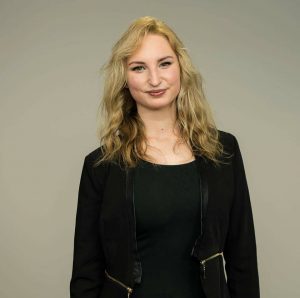“Science is never boring, you just need to find a field, which interests you”, says Julija Kravčenko, studying Biomedical Electronics at Kaunas University of Technology (KTU). Only in her second year, she has already experienced conducting scientific research, creating innovative products and participating in international training. Just recently Julija has passed the national selection for the internship at NASA Ames Research Center, and is waiting for the final confirmation of the internship.
A student in GIFTed Talend Academy, Julija has started to work with research mentor Andrius Petrėnas from KTU Biomedical Engineering in her second semester, in the first year. The area of Julija’s research interests covers bio signals’ processing, bio sensors, wearable health monitoring devices.
 “I was involved in a research project related to wearable bio signals transmitters – I had to prepare the protocol, to collect the sample of respondents and to assure that the experiment was conducted smoothly”, explains the student.
“I was involved in a research project related to wearable bio signals transmitters – I had to prepare the protocol, to collect the sample of respondents and to assure that the experiment was conducted smoothly”, explains the student.
The paper on research results will be published in scientific journal Scientific Reports, belonging the Nature group publications. At the Biomedical Engineering Institute laboratories in KTU Santaka Valley, Julija was also working with other projects and was involved in developing other health monitoring devices, such as smart bracelet and other wearables.
Other projects of the 20-year-old student involve building automatic luggage transporting carriage for Vilnius Airport, investigating LOPES exoskeleton’s costs and benefits (during the international summer school CuriousU in Twente University, Netherlands), developing additional sensors and information system for objectivising kinesitherapeutic activities.
“Once you find the field, which is interesting for you, science cannot be boring. After all – science is everywhere, be it related to nature, technologies, music or other areas. Science can answer all your questions. I always wonder about various things in life: how does this device work? How do people behave and why? How are pictures and music born? When you are conducting research and talk to other scientists you can satisfy your curiosity. Also, science can solve various societal problems, and people, with whom you have a chance to communicate, are fantastic!”, says Julija.
Among her nearest future plans is a summer school in Sankt Petersburg, where she’ll expand her knowledge on bio signals’ processing. Also, just recently the KTU student has received exciting news from NASA: Julija has passed the national selection and is waiting for the confirmation of her autumn internship in NASA Ames Research Center.